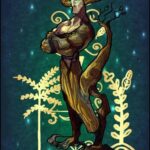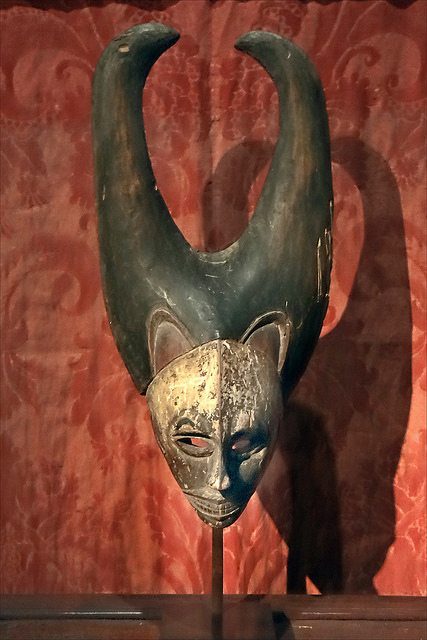In the rich tapestry of Vodou mythology, the figure of Ibo holds a significant place. Ibo is often associated with the spiritual beliefs and practices of the African diaspora, particularly those that emerged in Haiti and other parts of the Caribbean. Understanding Ibo requires a deep dive into the cultural and historical contexts from which this figure arises. This exploration reveals the complex interplay between African traditions, colonial history, and the evolution of Vodou as a religion.
The Origins of Ibo in Vodou
The origins of Ibo can be traced back to the West African cultures that influenced Vodou. The term “Ibo” refers to a specific ethnic group from the region, primarily located in what is now Nigeria. Their beliefs and practices have been integrated into Vodou, enriching its spiritual landscape. The Ibo people brought with them a profound understanding of the spiritual world, including a pantheon of deities and ancestral spirits that have influenced the Vodou tradition.
 Maman Brigitte
Maman BrigitteIn the context of Vodou, Ibo is often viewed as a representation of strength and resilience. The Ibo people’s history of struggle against colonization and their fight for freedom resonate deeply within the Vodou practice. This connection highlights how Vodou serves not only as a religious system but also as a means of cultural identity and resistance against oppression. The incorporation of Ibo elements into Vodou is a testament to the adaptability and survival of African traditions in the face of adversity.
The Role of Ibo Spirits in Vodou
Ibo is often associated with various spirits known as Loa in Vodou. These spirits are intermediaries between humans and the divine. Each Loa has distinct characteristics, personalities, and areas of influence. The Ibo spirits are particularly known for their connection to the earth and the natural world, emphasizing the importance of nature in Vodou practices. They are called upon for guidance, protection, and support in everyday life.
Among the Ibo spirits, one of the most revered is Obatala, who represents purity and wisdom. Followers often seek Obatala’s guidance when faced with difficult decisions or moral dilemmas. Another important Ibo spirit is Ogun, the spirit of iron and war, symbolizing strength and resilience. Ogun is frequently invoked during rituals that involve protection and the overcoming of obstacles. The presence of these spirits in Vodou ceremonies underscores the Ibo’s significant influence on the religion.
 Ghede
GhedeIbo Rituals and Practices
The rituals associated with Ibo in Vodou are vibrant and filled with meaning. These ceremonies often involve music, dance, and offerings to the spirits. Drumming plays a crucial role in Ibo rituals, as it is believed to summon the spirits and create a connection between the physical and spiritual worlds. The rhythms and beats used in these ceremonies are deeply rooted in African traditions, showcasing the rich cultural heritage of the Ibo people.
During an Ibo ceremony, participants may offer food, drink, and other gifts to the spirits. These offerings are seen as a way to show respect and gratitude, as well as to seek blessings and guidance. Animal sacrifices may also be part of some rituals, although this practice varies among different Vodou practitioners. The goal of these rituals is to establish a harmonious relationship with the spirits, allowing individuals to receive their protection and wisdom in daily life.
The Symbolism of Ibo in Vodou
The symbolism of Ibo in Vodou extends beyond the rituals and practices. It encompasses a wide range of cultural and spiritual meanings. For many practitioners, Ibo represents the connection to their ancestors and the importance of honoring those who came before them. This ancestral reverence is a fundamental aspect of Vodou, as it fosters a sense of community and continuity within the culture.
 Grand Bois
Grand BoisFurthermore, Ibo symbolizes the struggle for freedom and the resilience of the African spirit. In the face of historical injustices, the incorporation of Ibo elements into Vodou serves as a reminder of the strength and perseverance of the Ibo people. This symbolism is particularly poignant in the context of Haiti’s history, where Vodou played a crucial role in the fight for independence from colonial rule.
Ibo and Contemporary Vodou Practice
In contemporary Vodou practice, the figure of Ibo continues to hold significant importance. Many practitioners actively incorporate Ibo elements into their spiritual lives, honoring the traditions and beliefs that have been passed down through generations. This ongoing connection to Ibo reflects the adaptability of Vodou as a living religion, one that evolves while remaining rooted in its historical and cultural contexts.
Today, Ibo is often celebrated in community gatherings, festivals, and rituals that highlight the rich heritage of the Ibo people. These events provide an opportunity for practitioners to come together, share their experiences, and strengthen their bonds within the community. The presence of Ibo in these contemporary practices serves as a reminder of the enduring legacy of African traditions in the face of modern challenges.
Challenges and Misunderstandings of Ibo in Vodou
Despite its rich cultural significance, the figure of Ibo in Vodou often faces challenges and misunderstandings. Many people outside the Vodou tradition may have misconceptions about its practices, viewing them through a lens of superstition or misunderstanding. This lack of awareness can lead to stereotypes and misrepresentations of Vodou and its practitioners, overshadowing the profound spiritual and cultural dimensions of the religion.
Additionally, the appropriation of Vodou symbols and practices in popular culture can dilute the true meaning of Ibo and its significance within the Vodou community. Misrepresentation in media can contribute to a lack of respect for the traditions and beliefs that have been upheld for centuries. It is crucial for both practitioners and outsiders to engage in open dialogues that promote understanding and respect for the complexities of Vodou and the role of Ibo within it.
Learning from Ibo: Lessons in Resilience and Identity
The story of Ibo in Vodou is not just a narrative of spirituality; it also carries important lessons in resilience and identity. The struggles faced by the Ibo people and their incorporation into Vodou highlight the importance of maintaining cultural roots while adapting to new realities. This duality is a fundamental aspect of many diasporic communities, where individuals strive to preserve their heritage while navigating contemporary challenges.
Through the lens of Ibo, practitioners can learn about the significance of community and solidarity. The rituals and practices associated with Ibo emphasize the importance of coming together to support one another, fostering a sense of belonging and shared identity. In a world that often seeks to divide, the teachings of Ibo remind us of the strength found in unity and the power of collective resilience.
Conclusion: The Enduring Legacy of Ibo
The legacy of Ibo in Vodou is one that continues to resonate with practitioners and scholars alike. It serves as a reminder of the rich cultural heritage that has shaped Vodou and the ongoing relevance of African traditions in contemporary society. By understanding and honoring the figure of Ibo, individuals can deepen their appreciation for the complexities of Vodou mythology and the powerful stories that it tells.
